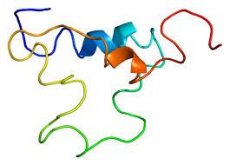New publications
Scientists have discovered the property of an insulin-like molecule that can help control appetite
Last reviewed: 02.07.2025

All iLive content is medically reviewed or fact checked to ensure as much factual accuracy as possible.
We have strict sourcing guidelines and only link to reputable media sites, academic research institutions and, whenever possible, medically peer reviewed studies. Note that the numbers in parentheses ([1], [2], etc.) are clickable links to these studies.
If you feel that any of our content is inaccurate, out-of-date, or otherwise questionable, please select it and press Ctrl + Enter.

The microflora of the large intestine contains a large number of molecules. One of them is insulin-like peptide 5, the purpose of which remained a mystery to scientists until recently. As studies have shown, this molecule may be useful in the treatment of poor appetite or obesity.
As researchers at one of the US universities have discovered, insulin-like peptide 5 is involved in transmitting signals about satiety or hunger to the brain.
A recent research project has shown that there is a constant interaction between the brain and the gut. Scientists now know two hormones that influence appetite. The first hormone is called ghrelin, which works at the brain level, and insulin-like peptide 5 acts directly in the gut.
The research team conducted an experiment on rodents, during which healthy individuals were injected with insulin-like peptide 5, which stimulated appetite in mice. The effect of the molecule began approximately 15 minutes after administration and lasted for three days. At the same time, the scientists noted that in genetically modified laboratory rodents that did not have insulin-like peptide 5 receptors, appetite stimulation did not occur when the molecule was administered.
A group of scientists managed to create an artificial insulin-like peptide 5, i.e. they were able to get closer to developing a drug that can affect appetite. Scientists assume that they will be able to create a remedy that will help suppress the feeling of hunger in patients with type 2 diabetes or obesity. Also, a similar effect can be used to develop a drug for the treatment of patients who need a good appetite, for example, after chemotherapy or HIV-infected patients. A distinctive feature of the new drugs that will be created on the basis of insulin-like peptide 5 is that there is no need to overcome the blood-brain barrier, which will solve problems with delivery.
The problem of obesity has recently become increasingly relevant. Recent work by scientists at one of the medical universities has shown that obesity is not always a pathology. As experts have found out, an enzyme called heme oxygenase-1 is of key importance in the development of metabolic disorders. The level of this enzyme in the human body can show how dangerous obesity can be in each individual case. According to statistics, almost 1/4 of overweight people have normal metabolism, i.e. they are not susceptible to the development of diabetes or systemic inflammatory processes.
Experts suggest that the concept of "healthy obesity" does exist. Earlier studies showed that there is a direct link between metabolic disorders and the level of heme oxygenase-1 in the liver and adipose tissue. In addition, the results of twin studies showed that in metabolic disorders, more enzymes are present in the human body.
Studies on laboratory rodents have shown that without heme oxygenase-1, the level of inflammation markers decreases. When the gene is removed from the liver, even with too much caloric nutrition, the organ functions normally and a decrease in insulin was not observed.
Scientists believe that it is the enzyme heme oxynase-1 that provokes inflammation and metabolic syndrome.

 [
[